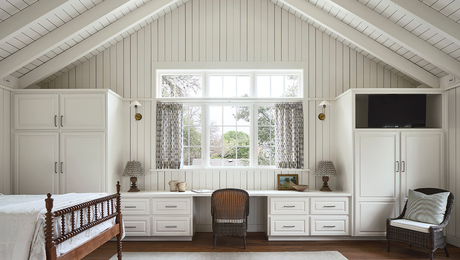We are building in the mountains of North Carolina, land of summer lightning storms. We are wondering about the efficacy of installing lightning rods/grounding wires to the buildings. Some arguments against are that the rods attract lightning. What are (if any) the alternatives……any words of wisdom from the audience?
Discussion Forum
Discussion Forum
Up Next
Video Shorts
Featured Story

This 654-sq.-ft. ADU combines vaulted ceilings, reclaimed materials, and efficient design, offering a flexible guest suite and home office above a new garage.
Featured Video
How to Install Exterior Window TrimHighlights
"I have learned so much thanks to the searchable articles on the FHB website. I can confidently say that I expect to be a life-long subscriber." - M.K.
Fine Homebuilding Magazine
- Home Group
- Antique Trader
- Arts & Crafts Homes
- Bank Note Reporter
- Cabin Life
- Cuisine at Home
- Fine Gardening
- Fine Woodworking
- Green Building Advisor
- Garden Gate
- Horticulture
- Keep Craft Alive
- Log Home Living
- Military Trader/Vehicles
- Numismatic News
- Numismaster
- Old Cars Weekly
- Old House Journal
- Period Homes
- Popular Woodworking
- Script
- ShopNotes
- Sports Collectors Digest
- Threads
- Timber Home Living
- Traditional Building
- Woodsmith
- World Coin News
- Writer's Digest


















Replies
If you got a nearby neighbor how about installing them on their place instead? :)
Start here but do a google search on lightning protection and you will find all the info you need.
http://www.lightningsafety.com/nlsi_lhm/lpts.html
The systems I'm familiar with have 'rods' about eight inches high at regular intervals along the ridge and atop a chimney mass or other high points. They do attract lightning, that's the point, but they attract it from the very immediate area, meaning it would hit the house and not the rods if the rods weren't there. With a properly installed system there is no risk of increasing the number or frequency of lightning strikes to your house. A whole house surge protector also fits in well with the basic objective of this system.
I think they provide a cone of protection. Military installation use them to protect explosives from lightning strikes. They think it works!
check out: http://www.loehrlightning.com/services.html
Frank DuVal
A proper system, properly installed, will definitely protect the building from lightning (though no such protection is 100% perfect).
DIY protection would be pretty iffy -- it's a fairly arcane art, due to the bizarre way that lightning behaves.
So the question is whether it's worth the (considerable) expense. One thing to do is to check with your insurance company to see how much of a discount you'd get.
At the very least be sure to properly ground any roof-top antennas. Things like wood stove flues should probably also be grounded, with a substantial ground wire. (Generally, furnace flues will be grounded through the furnace wiring and ductwork, but an additional ground there wouldn't hurt. Most plumbing vents are now plastic and not a problem.)
Also, of course, have a lightning arrester installed behind your electric meter or in the breaker panel.
happy?